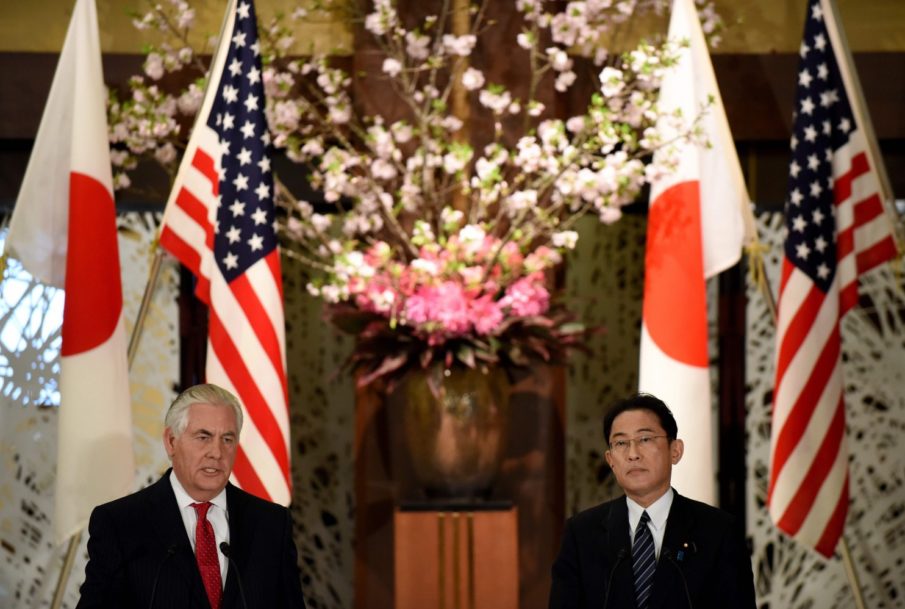American Secretary of State Rex Tillerson began his first international trip since being appointed in Tokyo on Thursday, where he met with Japan’s foreign minister, Fumio Kishida. In his remarks to the press after their meeting, Tillerson placed North Korea at the forefront of his agenda, making remarks that are sure to reverberate throughout the reclusive Asian nation.
“I think it’s important to recognize that the diplomatic and other efforts of the past twenty years to bring North Korea to a point of denuclearization have failed. We have twenty years of failed approach.” Tillerson said to reporters on the scene.
Tillerson also pointed out that throughout those twenty years of “failed” efforts, the United States has provided North Korea with $1.35 billion in aid intended to encourage the nation and its leaders to abandon their pursuit of developing nuclear weapons.
In 1994, a deal was brokered between North Korea and the United States in which the U.S. agreed to provide the nation with aid and two proliferation-resistant nuclear power plants in exchange for an immediate halt and eventual dismantling of their nuclear weapons program. The deal dissolved in 2002, and despite repeated efforts in the years since, neither the United States nor its international partners have made any headway in discouraging North Korea from developing nukes, particularly since Kim Jong Un took control after his father, Kim Jong Il, died.
“In the face of this ever escalating threat, it is clear that a different approach is required.” Tillerson said.
Tillerson declined to go into detail regarding just what a new approach may entail, explaining instead that part of the purpose of his visit was to discuss options with his Japanese counterpart. President Trump and his staff are said to be currently amidst a review of America’s North Korean policy, with some on Capitol Hill championing “kinetic options” – a polite phrase that means direct military intervention.
In Beijing, the North Korean embassy also held a press conference, in which North Korean Minister Pak Myong-ho levied another round of accusations at the United States and South Korea for their ongoing military exercises intended to prepare military forces in the region for a potential attack by North Korean forces.
“The joint military exercises by the hostile forces are aimed at preemptive strikes against the DPRK,” Minister Pak Myong-ho said. “Therefore, the peace and stability of the Korean Peninsula is under serious threat. Now the situation is already on the brink of nuclear war.”
Of course, these types of threats are a common occurrence from Kim Jong Un’s regime, but calling a press conference in China in order to deliver them is a fairly uncommon one, possibly indicating North Korea’s willingness to escalate the situation beyond their normal, if not dramatic, rhetoric.
Pak Myong-ho went on to state that the exercises being conducted south of their border could “turn into real combat at any time,” adding that keeping the nation’s defenses on high alert throughout the operation is “a sovereign state’s legitimate right of self-defense.”
He concluded his statements by saying that as long as the U.S. “unceasingly threatens force at the DPRK’s door step, the DPRK will consistently conduct nuclear tests.”
Tillerson’s trip has him scheduled to visit South Korea as well as China before returning to the United States, and conversations regarding potential action against the North Koreans will likely be held in each, though potentially with significantly different tones. China has tried to walk a balance between supporting its North Korean ally and maintaining a reasonable level of criticism for some of Kim Jong Un’s actions. They publicly denounced North Korea’s nuclear efforts and have even taken some small actions to curb them, but have made it clear that they are unwilling to support any endeavor that could destabilize the North Korean government.
Japan’s foreign minister echoed Tillerson’s stance, saying, “Japan recognizes threats from North Korea’s provocations have entered a new stage.” North Korea’s usual threats notwithstanding, the introduction of potentially operable medium and even long-range nuclear delivery systems in North Korea’s arsenal leaves little room to discount the small nation. Their most recent test saw three of four missiles launched landing in Japan’s exclusive economic zone, a move many believe was intended to test their ability to strike American bases on the Japanese island.
“North Korea and its people need not fear the United States or their neighbors in the region who seek only to live in peace with North Korea,” Tillerson pointed out in his statement – but it seems unlikely such a message will be received in Pyongyang.
Featured image courtesy of Getty Images










COMMENTS